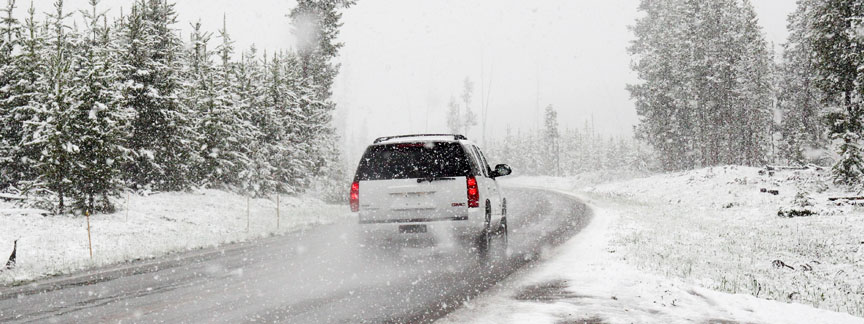What to keep in your winter survival kit
Are you ready for winter? Probably not, however…make sure your vehicle is. The NDSC believes preparation for any road conditions is key before leaving your house, and it starts with a great roadside assistance kit. You should always check road reports before traveling, luckily the North Dakota Transportation Department has you covered, see the travel map here.
Sure, it can be convenient to keep frequently used items in the car instead of repeatedly dragging them to and from the house. But not everything can withstand winter’s freezing temperatures.
Here are the things to keep in your car during winter to help you stay safe—and what shouldn’t be left out in the cold:
Ten things for your winter car survival kit
- Sturdy ice scraper and brush:While scraping ice is no fun, you must clean all your windows before driving.
- Snow shovel: A collapsible shovel won’t take up too much room in your trunk.
- Gloves, hats and blankets: Enough for anyone who rides in your car.
- Bag of abrasive material (such as rock salt, sand or kitty litter): Spread them around your tires if you get stuck.
- Flashlight and extra batteries: Daytime is shorter in the winter than in summer, so it’s best to have a source of light just in case.
- Portable phone charger: You want your lifeline charged should trouble arise.
- Jumper cables: A dead battery is a leading cause of roadside trouble.
- Snacks: Nonperishable is best, but be careful with beverages (see below).
- First aid kit: If you have one already, make sure it hasn’t expired.
- Hazard triangles or LED flashers: A road safety vest also helps you put safety first.
Five things to avoid keeping in your car during winter
- Electronics: Freezing temperatures can damage laptop computers, tablets and cell phones. Lithium-ion batteries that stop working in the cold will usually perk back up when they’ve been warmed, but repeated exposure to extreme temperatures can reduce their ability to hold a charge. And because moving a computer to a warm location can cause internal condensation that may damage it if you use it right away, let it warm up for a few minutes before turning it on.
- Medications: Whether prescription or over the counter, some drugs can be affected by extreme cold. Freezing can reduce their potency, cause ingredients to physically separate or even change the molecular form of the medication. When in doubt, check the label for storage information and talk to your pharmacist about medications that may have been exposed to cold temperatures.
- Beverages: If it’s below freezing outside and you leave canned or bottled drinks in your car, you may come back to a big mess. The liquids will expand when they freeze, and the cans or bottles could explode.
- Windshield washer fluid: Most windshield washer fluids contain chemicals that prevent them from freezing. But some brands (and homemade vinegar-and-water mixes) can freeze if the temperature drops low enough. If the fluid freezes, it will expand and could crack your washer fluid reservoir. So before it gets too cold outside, make sure you’re using fluid that can withstand the chill without freezing.
- Musical instruments: Freezing temperatures can make an instrument contract, which can cause it to go out of tune. In some cases—for example, if the instrument is made of wood—cold, dry air can cause it to crack. When an instrument has been left in a cold car, warm it up gradually.
Information Provided by AAA




